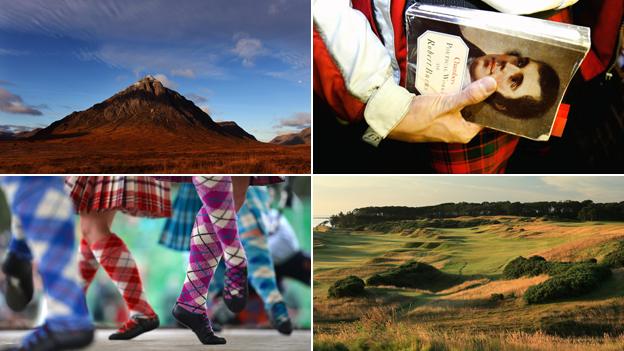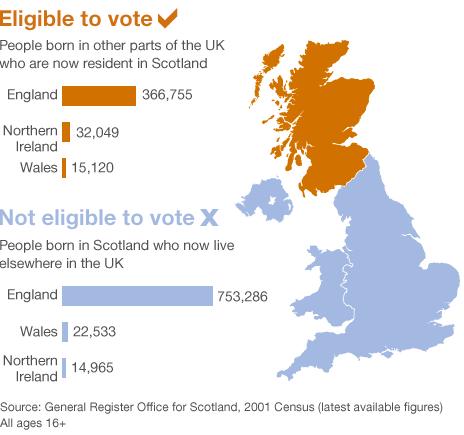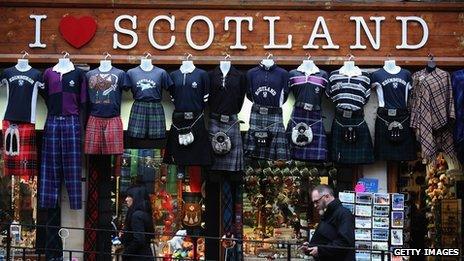The formula for Scottishness
- Published

There are five million people in Scotland. Those of voting age can have their say in the independence referendum. The 800,000 Scots in the rest of the UK cannot vote in it. But what is the essence of being Scottish?
It's not about being able to tolerate the sound of bagpipes, or preferring Irn Bru to Coca-Cola, or saying "How no?" instead of "Why not?".
Instead, it all comes down to where you bide - that is, live.
When the referendum on Scottish independence is held in the autumn of 2014, only residents of Scotland will be eligible to vote.
As a result, almost 400,000 people living north of the border but born in other parts of the UK will get to take part, while 800,000 Scots living in England, Northern Ireland and Wales will not.
"Given that Scotland has a population of just five million, 800,000 is a huge number," says David McCrone, professor of sociology at the University of Edinburgh.
"And that makes the emigres a very interesting kind of person."
I'm one of them. I spent the first 22 years of my life in Scotland before heading to London for work and, without ever really intending to do so, settling.
By any measure, my accent, vocabulary and appetite for cholesterol-rich foodstuffs still mark me out as a Scot.
I think "glaikit" is a superior term to "stupid", "messages" preferable to "groceries" and "shoogly" more mellifluous than "unstable". The miserable fortunes of the Scottish international football team depress me no less than if I were following from my hometown of Dumfries.
And in the event of independence, my Scottishness would gain legal expression. Under proposals by the Scottish National Party (SNP) government, the fact I was born in Edinburgh would entitle me to citizenship of a sovereign Scotland, even if I continued to remain in exile.
Living abroad has not stopped one of the world's most celebrated Scots, Sir Sean Connery, from steadfastly backing the nationalist cause in his homeland.
In protest at being disenfranchised, James Wallace, a 23-year-old fellow Dumfries native turned London resident, has launched a petition demanding that expat Scots in other parts of the UK be allowed to participate in the referendum.

Scots ministers say this simply would not be practical.
And, indeed, it's difficult to imagine how an electoral register of everyone who considered themselves a Scot might be drawn up.
Who, after all, is Scottish? Those born in Scotland? People with Scottish ancestry? Anyone who is partial to Tunnock's teacakes and the music of Jimmy Shand?, external
For James Mitchell, professor of politics at the University of Strathclyde, residency is the only logical definition of Scottishness in terms of political representation. If I want a say over Scotland's constitutional status, he believes, I should move back there.
"It would be absurd to allow anyone who claimed to be Scottish a vote," Mitchell says.
"By extension, it would be wrong - and perhaps more worryingly wrong - to exclude those who do not feel Scottish a vote if they lived in Scotland."
Of course, being Scottish is not, for most, about taking part in elections.
For some it is about family heritage. Witness the likes of Rod Stewart and Alastair Campbell - born in England, blessed with distinctly non-Caledonian accents, but, by dint of their parentage, regular tartan-wearers and staunch supporters of the Scottish football team (Campbell even plays the bagpipes).
Or there is the concentration of Scottish migrant steelworkers' descendants in the town of Corby, Northamptonshire. Many speak with a Glaswegian-esque brogue, stage an annual Highland Gathering and, according to former MP Louise Mensch,, external buy 17 times more Irn Bru from their local branch of Asda than anywhere else in England.
For this reason, Dr David Hume, a senior member of the Orange Order, said people in Northern Ireland with "Ulster Scots" backgrounds were "stakeholders", external who should be given a vote in the referendum.
However, on this genealogical basis, I - like many other native-born Scots - would not actually be considered all that Scottish. Of my four grandparents, two were Irish and one was the son of an Englishman.
Scotland has, after all, witnessed successive waves of migration from Scandinavian countries to the north (Orkney and Shetland were earldoms under Norway until 1468), Ireland to the west and England to the south. More recent population shifts have seen the eastern European community expand, while there are now an estimated 90,000 Asian Scots.
As a result, mainstream Scottish nationalism has tended to shy away from defining Scottishness in ethnic terms, says McCrone. In this respect it differs from a country like Germany, whose citizenship laws are based on the principles of jus sanguinis (right of blood).
Instead, scholars trying to understand the Scots identity have focused on its symbolism.
Forthcoming research co-authored by McCrone saw 1,248 Scots asked to pick two items from a list which they felt were most important to Scottish culture. Some 47% chose the landscape, 39% music and the arts and 38% the Scottish "sense of equality".

The first choice might not be surprising, but is intriguing given that 75% of Scottish residents are concentrated in the largely urban central belt.
I grew up in a town deep in the Lowlands. But like a plurality of my countryfolk, I'll admit to a lurch of sentimentality when footage of Glencoe or the Cuillins flashes up on, say, Countryfile.
And in my cups I can be relied to bang on jingoistically about Scotland's contribution to the arts - the literature of Robert Burns, Muriel Spark and James Kelman; the music of the Jesus and Mary Chain, Belle and Sebastian and Teenage Fanclub; Scots-set films like Whisky Galore, Gregory's Girl and Trainspotting.
But Scotland's iconography is composed of negative stereotypes, too - heavy drinking, violence, deprivation and heart disease, all rooted in social problems no Scot would pretend didn't exist, despite our self-image as more egalitarian than our southern neighbours.
And another danger of defining Scottishness in a series of national symbols - kilts, the thistle, the Loch Ness monster and so on - is that it reduces the nation's identity to the kind of tourist kitsch sold along Edinburgh's Royal Mile.
But for Glasgow writer and comedian Janey Godley, it's a point of pride that Scotland can be so easily packaged.
"The main thing I love about Scottish identity is that it travels," she says. "It's not hard to figure out. The scenery, Billy Connolly, haggis... everyone recognises it straight away."
Perhaps she's right that a progressive, outward-looking nation should take pride in being so easily understood by outsiders.
In self-imposed exile I'll continue to identify with a land of dourness, drizzle, malt whisky and midges.
But as for choosing between independence or the union, that's a decision for those I left behind. Wha's like us?